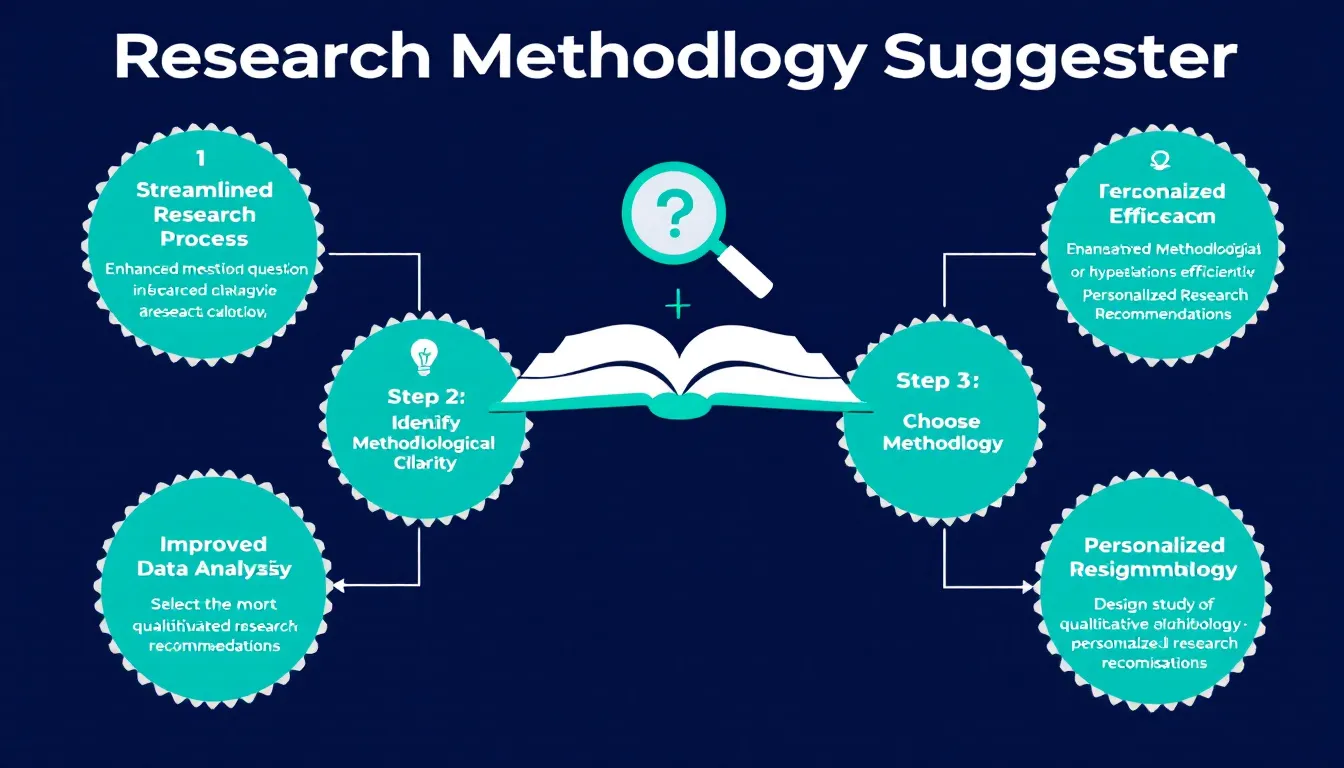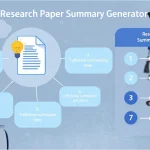Is this tool helpful?
How to Use the Research Methodology Suggestion Tool Effectively
The Research Methodology Suggestion Tool is designed to assist academic researchers in selecting appropriate research methods for their specific topics. To use this tool effectively, follow these steps:
- Enter your research topic: In the provided text area, clearly describe your research topic or area of study. Be as specific as possible to receive the most relevant suggestions. For example:
- “The impact of remote work on employee productivity and job satisfaction in the tech industry”
- “The effectiveness of mindfulness-based interventions in reducing stress among college students”
- Submit your request: Click the “Suggest Research Methodologies” button to generate a comprehensive list of both qualitative and quantitative research methods suitable for your topic.
- Review the suggestions: Carefully read through the suggested methodologies, their justifications, potential advantages, and limitations.
- Copy the results: Use the “Copy to Clipboard” button to easily save the suggestions for future reference or to incorporate them into your research proposal.
Introduction to the Research Methodology Suggestion Tool
The Research Methodology Suggestion Tool is an innovative solution designed to streamline the process of selecting appropriate research methods for academic studies. This tool leverages expert knowledge to provide researchers with a comprehensive list of both qualitative and quantitative methodologies tailored to their specific research topics.
By offering a wide range of research methods along with their justifications, potential advantages, and limitations, this tool empowers researchers to make informed decisions about their study designs. It serves as a valuable resource for students, academics, and professionals across various disciplines, helping them to enhance the rigor and validity of their research projects.
Purpose and Benefits
The primary purpose of the Research Methodology Suggestion Tool is to assist researchers in identifying the most suitable research methods for their studies. By doing so, it offers several key benefits:
- Time-saving: Eliminates the need for extensive literature searches to identify appropriate methodologies
- Comprehensive overview: Provides a balanced mix of qualitative and quantitative methods
- Informed decision-making: Offers justifications and potential advantages for each suggested method
- Anticipation of challenges: Highlights potential limitations and suggests solutions or alternative approaches
- Academic rigor: Ensures suggestions are rooted in academic literature, maintaining research validity
- Versatility: Applicable across various academic disciplines and research topics
Benefits of Using the Research Methodology Suggestion Tool
1. Enhanced Research Quality
By providing a comprehensive list of suitable research methodologies, the tool helps researchers design more robust studies. This leads to higher-quality research outcomes and increased chances of publication in reputable academic journals.
2. Time and Resource Efficiency
Researchers can save significant time and resources by quickly accessing a curated list of relevant methodologies. This efficiency allows for more time to be dedicated to data collection, analysis, and interpretation.
3. Broadened Methodological Perspective
The tool exposes researchers to a wide range of methodologies they might not have initially considered. This broadened perspective can lead to more innovative and comprehensive research designs.
4. Improved Research Planning
By providing information on potential limitations and challenges, the tool helps researchers anticipate and plan for potential obstacles in their studies. This foresight can lead to more realistic project timelines and resource allocation.
5. Educational Value
For novice researchers or students, the tool serves as an educational resource, introducing them to various research methodologies and their applications. This exposure can enhance their understanding of research design principles.
6. Interdisciplinary Approach
The tool’s ability to suggest methodologies across various disciplines encourages interdisciplinary research approaches, potentially leading to more innovative and comprehensive studies.
Addressing User Needs and Solving Specific Problems
The Research Methodology Suggestion Tool addresses several key challenges faced by researchers:
1. Overcoming Methodological Uncertainty
Many researchers, especially those in the early stages of their careers, face uncertainty when selecting appropriate research methods. The tool alleviates this problem by providing a curated list of relevant methodologies, along with their justifications and potential advantages.
2. Balancing Qualitative and Quantitative Approaches
Achieving the right balance between qualitative and quantitative methods can be challenging. The tool addresses this by suggesting a mix of both approaches, allowing researchers to consider a well-rounded methodological framework for their studies.
3. Anticipating Research Challenges
By highlighting potential limitations and offering solutions or alternative approaches, the tool helps researchers proactively address methodological challenges. This foresight can significantly improve research planning and execution.
4. Enhancing Methodological Justification
When writing research proposals or dissertations, justifying the chosen methodology is crucial. The tool provides researchers with well-founded arguments for their methodological choices, rooted in academic literature.
5. Promoting Methodological Innovation
By suggesting a wide range of methods, including potentially unfamiliar ones, the tool encourages researchers to explore innovative approaches to their studies. This can lead to more original and impactful research outcomes.
Practical Applications and Use Cases
The Research Methodology Suggestion Tool has numerous practical applications across various academic disciplines. Let’s explore some examples:
1. Social Sciences Research
A researcher studying the impact of social media on political polarization might receive the following suggestions:
- Quantitative methods:
- Large-scale survey research to measure attitudes and behaviors
- Social network analysis to map information flows and opinion clusters
- Time-series analysis to track changes in polarization over time
- Qualitative methods:
- In-depth interviews with social media users to understand their experiences
- Content analysis of social media posts to identify polarizing themes
- Focus groups to explore group dynamics and opinion formation
2. Medical Research
For a study on the effectiveness of a new treatment for chronic pain, the tool might suggest:
- Quantitative methods:
- Randomized controlled trial to compare the new treatment with existing options
- Longitudinal study to assess long-term effects and side effects
- Meta-analysis of existing studies on similar treatments
- Qualitative methods:
- Patient diaries to capture detailed experiences with the treatment
- Semi-structured interviews with healthcare providers to gather professional insights
- Phenomenological study to understand the lived experience of chronic pain patients
3. Environmental Science Research
A researcher investigating the impact of urban green spaces on air quality might receive these suggestions:
- Quantitative methods:
- GIS mapping and spatial analysis to correlate green spaces with air quality data
- Time-series analysis of air quality measurements before and after green space implementation
- Regression analysis to identify factors influencing air quality improvements
- Qualitative methods:
- Case studies of cities with successful green space initiatives
- Interviews with urban planners and environmental scientists
- Observational studies of green space usage patterns
4. Educational Research
For a study on the effectiveness of blended learning approaches in higher education, the tool might suggest:
- Quantitative methods:
- Quasi-experimental design comparing blended learning with traditional approaches
- Survey research to measure student satisfaction and engagement
- Learning analytics to track online engagement and performance
- Qualitative methods:
- Ethnographic study of student experiences in blended learning environments
- Action research involving educators implementing blended learning approaches
- Thematic analysis of student reflections on their learning experiences
Frequently Asked Questions (FAQ)
1. How does the Research Methodology Suggestion Tool work?
The tool analyzes your input research topic and uses expert knowledge to suggest appropriate qualitative and quantitative research methodologies. It provides justifications, potential advantages, and limitations for each suggested method.
2. Can I use this tool for any academic discipline?
Yes, the tool is designed to be versatile and applicable across various academic disciplines. It adapts its suggestions based on the specific research topic you input.
3. How should I choose between the suggested methodologies?
Consider your research objectives, available resources, and the strengths and limitations of each method. You may also combine multiple methods for a more comprehensive approach.
4. Can I use this tool for collaborative research projects?
Absolutely! The tool can be particularly useful for collaborative projects, as it provides a common starting point for discussing and selecting research methodologies among team members.
5. How often is the tool’s methodology database updated?
The tool’s database is regularly updated to incorporate emerging research methodologies and best practices in various fields.
6. Can I save or export the suggested methodologies?
Yes, you can easily copy the suggestions to your clipboard using the “Copy to Clipboard” button provided in the tool’s interface.
7. Is this tool suitable for both beginner and experienced researchers?
Yes, the tool is designed to be helpful for researchers at all levels. Beginners can use it as a learning resource, while experienced researchers can benefit from its comprehensive suggestions and potential new methodological approaches.
8. Can the tool suggest mixed-methods approaches?
Yes, the tool often suggests a combination of qualitative and quantitative methods when appropriate for the research topic, encouraging mixed-methods approaches.
9. How detailed are the methodology descriptions?
The tool provides concise but informative descriptions of each suggested methodology, including its relevance to your topic, potential advantages, and limitations.
10. Can I use this tool for grant proposals or research planning?
Absolutely! The tool’s suggestions can be valuable for outlining your research methodology in grant proposals or during the planning stages of your research project.
Important Disclaimer
The calculations, results, and content provided by our tools are not guaranteed to be accurate, complete, or reliable. Users are responsible for verifying and interpreting the results. Our content and tools may contain errors, biases, or inconsistencies. We reserve the right to save inputs and outputs from our tools for the purposes of error debugging, bias identification, and performance improvement. External companies providing AI models used in our tools may also save and process data in accordance with their own policies. By using our tools, you consent to this data collection and processing. We reserve the right to limit the usage of our tools based on current usability factors. By using our tools, you acknowledge that you have read, understood, and agreed to this disclaimer. You accept the inherent risks and limitations associated with the use of our tools and services.







